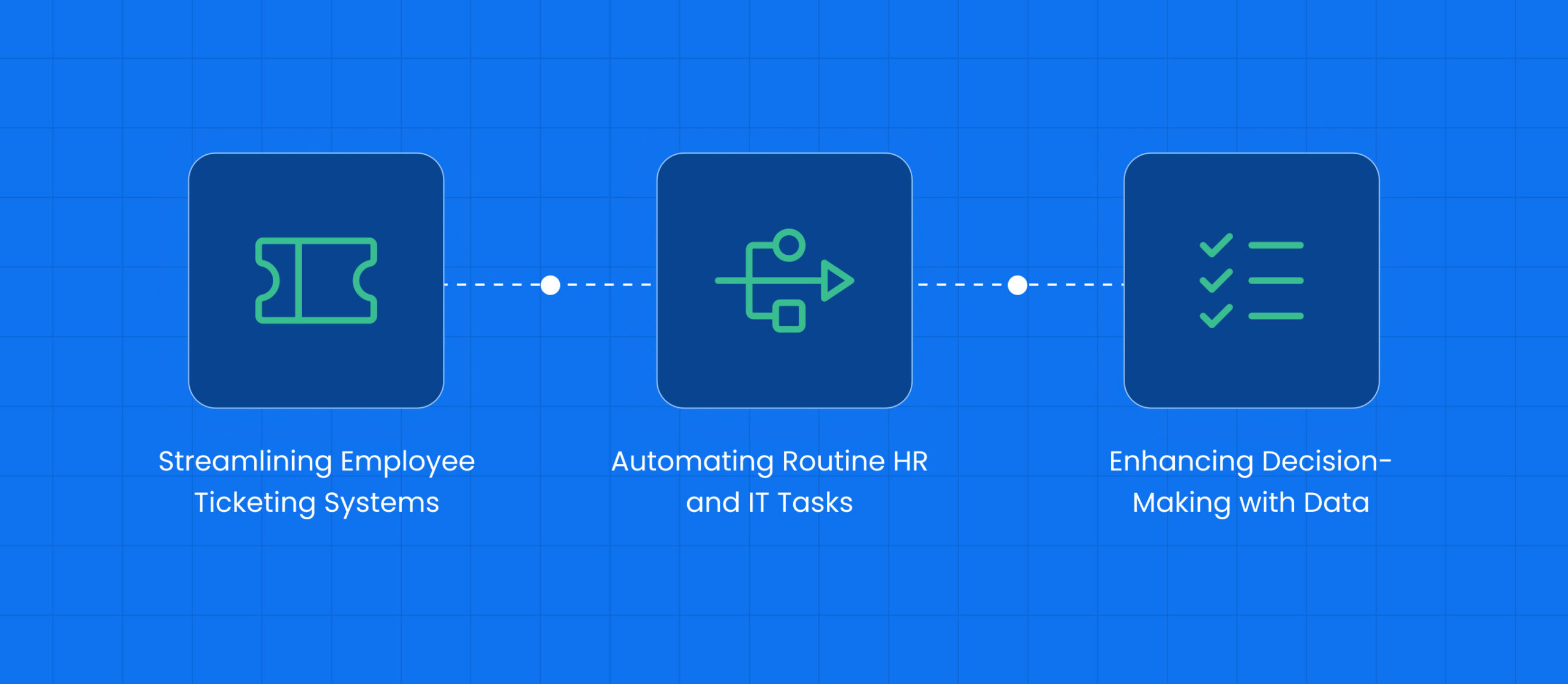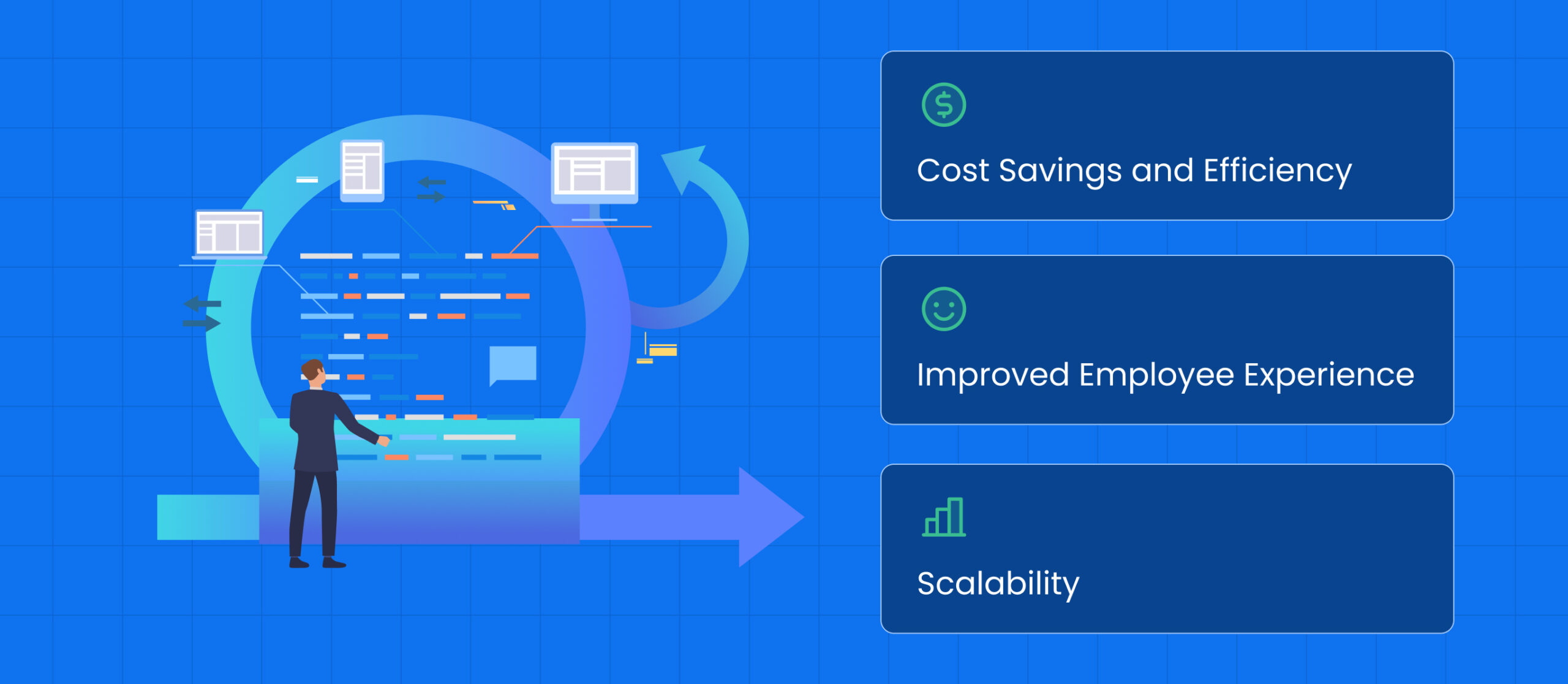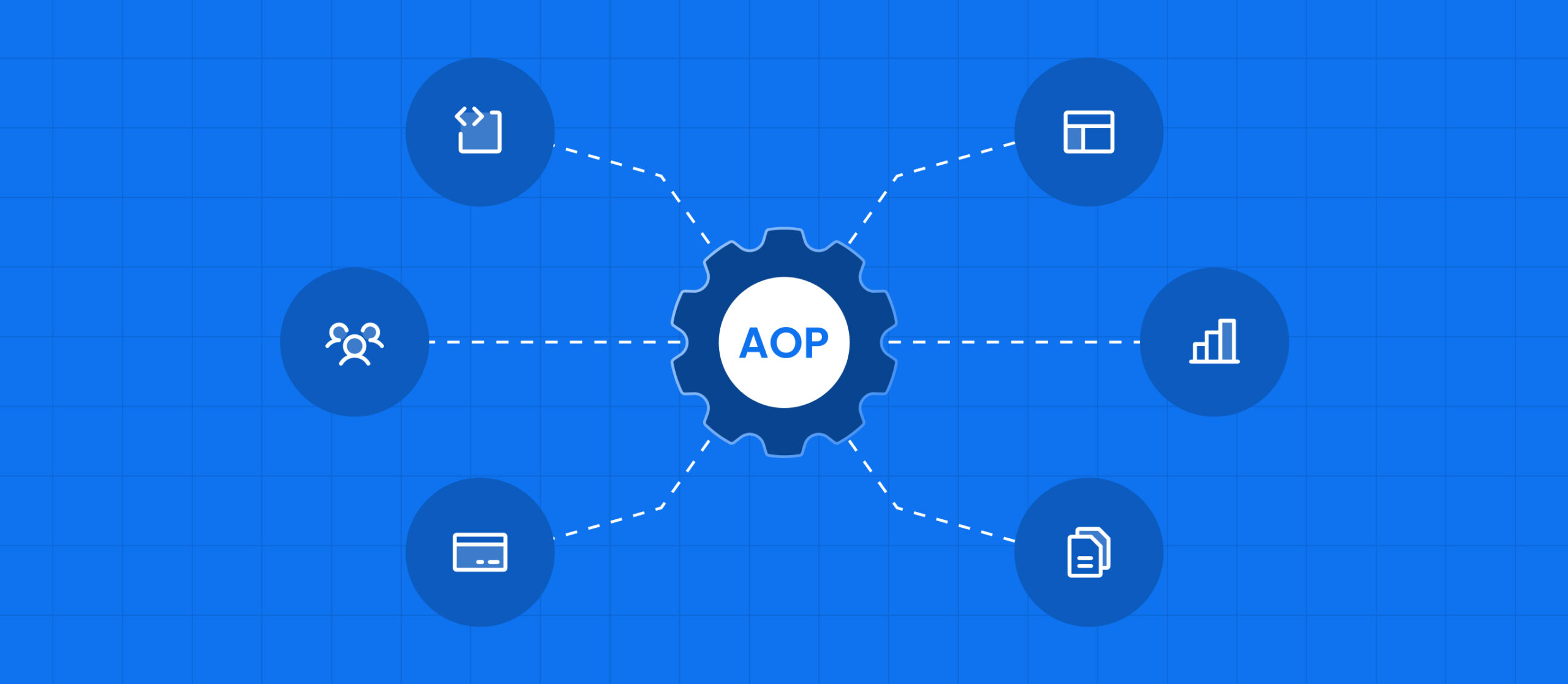Introduction
In the fast-paced world of large enterprises, managing complex workflows, especially those in HR, IT, and Finance, can become a significant challenge. Today, technology leaders are tasked with making operations more efficient, reducing manual workloads, and driving innovation across various departments. Enter AI workflow automation, a game-changing solution that is transforming the way companies handle employee requests and internal processes.
This blog will explore what AI workflow automation is, its key benefits, and why it’s crucial for technology leaders overseeing enterprise ticketing systems. We’ll also take a deeper dive into how Leena AI, with its pioneering Agentic AI in Workflow Automation solutions, is helping enterprises streamline their operations.
What Is AI Workflow Automation?
AI workflow automation refers to the use of artificial intelligence to automate and optimize business workflows. It involves leveraging AI technologies to handle repetitive tasks, make intelligent decisions, and speed up processes that would otherwise require manual intervention. By integrating AI into the workflow automation process, enterprises can reduce human error, enhance decision-making, and ultimately improve efficiency.
In the context of ticketing systems, AI workflow automation can automatically handle requests across various departments like IT, HR, and Finance. It can route tickets, gather necessary information, perform data analysis, and even provide real-time solutions. This level of automation not only speeds up the resolution process but also improves the overall employee experience.
How AI for Workflow Automation Is Changing the Game
AI for workflow automation is gaining immense traction in enterprises across the globe, and for good reason. Let’s look at how AI is enhancing the way organizations operate in 2025.

1. Streamlining Employee Ticketing Systems
AI is transforming the traditional ticketing system, which can be slow, error-prone, and cumbersome. AI-driven tools can automatically categorize and prioritize tickets, route them to the appropriate teams, and even offer immediate resolutions to common issues. For example, an AI system can recognize an employee’s query about password reset and autonomously process that request without the need for human intervention.
This automation not only improves response times but also ensures that teams can focus on more complex issues, leaving repetitive tasks to AI. As a result, employees experience faster support, and IT teams can manage more tickets in less time.
2. Automating Routine HR and IT Tasks
Human Resources departments are often burdened with repetitive tasks like onboarding, payroll management, benefits administration, and more. With AI-driven workflow automation, these tasks can be completed automatically. AI can extract relevant data, fill forms, and notify employees or HR teams about important updates. This saves HR professionals countless hours, allowing them to focus on more strategic aspects like employee engagement and talent development.
Similarly, in IT departments, AI workflow automation can be used for software patching, ticket triage, and other routine maintenance tasks. By automating these processes, organizations can reduce downtime and ensure systems remain up-to-date without manual intervention.
3. Enhancing Decision-Making with Data
AI excels at processing large volumes of data quickly and efficiently. In the realm of workflow automation, AI can analyze patterns from historical data and make intelligent recommendations. For example, AI can identify recurring issues in tickets and automatically trigger preventive actions, such as a system update or training session, based on its analysis.
This data-driven decision-making capability not only improves operational efficiency but also enables enterprises to be proactive rather than reactive when it comes to resolving issues.
The Value of AI-Driven Workflow Automation for Enterprises
AI-driven workflow automation is not just about reducing costs and increasing efficiency; it also brings significant value to enterprises in several key areas:

1. Cost Savings and Efficiency
By automating routine tasks, enterprises can free up valuable human resources to focus on more strategic work. This leads to significant cost savings, as AI systems can handle large volumes of requests without additional overhead. Moreover, workflows are completed faster and with fewer errors, which also contributes to greater efficiency.
2. Improved Employee Experience
When employees submit tickets for HR, IT, or Finance-related issues, they expect quick and effective resolutions. AI workflow automation enhances the employee experience by ensuring that requests are handled promptly, accurately, and consistently. Automated responses and resolutions can be delivered in real-time, reducing frustration and increasing satisfaction.
3. Scalability
As businesses grow, their workflows become more complex. Scaling up operations manually becomes increasingly difficult and resource-intensive. With AI for workflow automation, enterprises can scale their operations effortlessly. AI can handle the increased load, ensuring that workflows are streamlined even as the volume of tickets and requests grows.
Leena AI’s Pioneering Agentic AI in Workflow Automation Solutions
Leena AI’s Agent Operating Protocol (AOP) is an innovative framework designed to transform Business Process Automation (BPA) by integrating Agentic AI into enterprise workflows. Unlike traditional automation, which relies on rigid, rule-based systems, AOP enables intelligent agents to understand, reason, and act autonomously across various applications and departments, all within the process flow definitions and boundaries defined by the business owners.
Key Features of AOP
- Intelligent Agents: AOP employs specialized AI agents that can interpret process maps, flowcharts, and documentation directly, eliminating the need for manual coding. This approach significantly reduces development time and allows for dynamic adaptation to evolving business processes.
- Seamless Integration: The protocol facilitates smooth integration with existing enterprise applications, enabling agents to execute complex, multi-step tasks across systems like HR, IT, and Finance, often on the fly, without the need for extensive custom development and coding.
- Adaptability: AOP is designed to be flexible, allowing businesses to update processes by simply revising flowcharts or descriptions. Agents adapt instantly, ensuring that automation remains aligned with current business needs without the need for complete rebuilds or retesting.
- Enhanced Efficiency: By automating complex workflows and reducing manual intervention, AOP helps organizations achieve faster processing times, lower operational costs, and improved accuracy, leading to a significant return on investment.

Leena AI’s Agent Operating Protocol represents a significant advancement in BPA, moving beyond traditional automation to a more intelligent and adaptable system. By leveraging Agentic AI, AOP enables enterprises to automate complex workflows efficiently, adapt to changing business needs, and achieve substantial productivity gains. For more detailed information, you can visit the official AOP webpage.
Looking Ahead: The Future of AI Workflow Automation in 2025
As we move further into 2025, the role of AI in workflow automation will continue to expand. The technology will not only automate simple tasks but will also evolve to handle more complex decision-making processes. With AI’s ability to learn from historical data, it will become increasingly proactive, anticipating issues before they arise and suggesting improvements to workflows.
Moreover, as enterprises become more data-driven, AI will serve as a key enabler of this transformation. By analyzing large volumes of data, AI can optimize workflows in real-time, ensuring that businesses can stay agile and competitive in an ever-changing landscape.
Conclusion
AI workflow automation is more than just a trend—it’s a critical tool that can transform how large enterprises handle their HR, IT, and Finance processes. By embracing AI for workflow automation, businesses can achieve significant improvements in efficiency, cost savings, and employee satisfaction. Leena AI’s Agentic AI in Workflow Automation solutions are at the forefront of this transformation, offering enterprises the tools they need to streamline operations and improve the overall employee experience.
If you’re looking to take your enterprise’s workflow automation to the next level, it’s time to explore what Leena AI can do for you. Discover the power of AI-driven automation and how it can drive your business forward.
FAQs: Everything You Need to Know About AI Workflow Automation
-
What is AI workflow automation?
AI workflow automation refers to the use of artificial intelligence to automate business processes, such as ticketing, HR tasks, and IT support, improving operational efficiency and reducing human error.
-
How can AI for workflow automation improve employee ticketing systems?
AI for workflow automation can streamline ticket routing, categorize requests, and provide immediate resolutions for common issues, enhancing response times and overall employee satisfaction.
-
What industries benefit the most from AI workflow automation?
AI workflow automation benefits industries like IT, HR, Finance, and customer service, where repetitive tasks and large volumes of tickets can be automated for better efficiency and cost savings.
-
What are the main advantages of AI-driven workflow automation?
AI-driven workflow automation increases efficiency, reduces costs, scales operations, enhances decision-making, and improves the overall employee and customer experience.
-
Can AI workflow automation be customized for different departments?
Yes, AI workflow automation can be tailored to fit the specific needs of departments such as HR, IT, Finance, and customer support, ensuring that each department’s workflows are optimized.
-
What is Leena AI’s Agentic AI in Workflow Automation?
Leena AI’s Agentic AI uses machine learning and automation protocols to autonomously execute workflows in HR, IT, and Finance, improving efficiency and reducing manual effort in large enterprises.
-
How does Leena AI’s Agent Operating Protocol (AOP) enhance workflow automation?
The Agent Operating Protocol (AOP) allows for seamless integration with existing systems, automating business processes end-to-end and offering real-time, data-driven decisions across departments.
-
How scalable is AI-driven workflow automation?
AI-driven workflow automation is highly scalable, allowing organizations to handle increased workloads without adding additional resources, ensuring smooth operations even as businesses grow.
-
What types of tasks can be automated using AI workflow automation in IT, HR, and Finance?
Tasks such as ticket categorization, data processing, payroll management, compliance checks, employee queries, and many more can be automated, reducing the burden on human teams.
-
How does AI-driven workflow automation improve the employee experience?
AI-driven automation provides employees with faster resolutions to their queries, reduces frustration, and ensures that repetitive tasks are handled efficiently, allowing employees to focus on more meaningful work.
Learn more about Leena AI’s pioneering Agentic AI Architecture
Read Enterprise Customer Success Stories .
Check out why Gartner and many others recognise Leena AI as a leader in Agentic AI
Learn more about Voice-Enabled AI Colleague .
Sign up for our Webinars and Events








